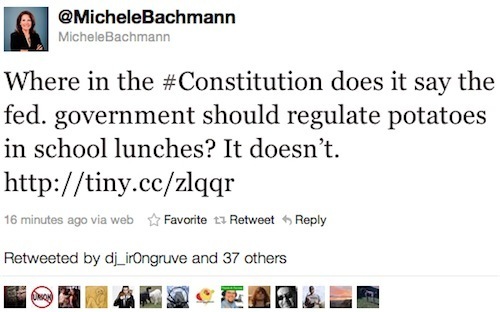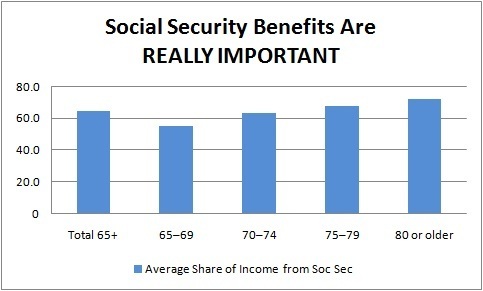Matthew Yglesias's Blog, page 2308
May 17, 2011
Michele Bachmann Thinks The Federal Government Can't Regulate The Use of Federal Money
I've always been slightly amused by the Michael Pollan theory that "mostly plants" is an adequate guide to nutrition, given that it's consistent with a diet consisting primarily of French fries. The US Department of Agriculture apparently shares these concerns and wants to promulgate rules limiting the use of potatoes in federally subsidized school lunch programs in order to encourage schools to offer healthier, more nutrient-rich vegetables. Naturally, this raises various objections from potato-producers and the politicians who represent potato-growing regions of the country.
I learned about this from Rep Michele Bachmann's Twitter feed:

This is emblematic of two horrible intellectual habits that have overtaken the current populist right. One is the incredibly slipshod constitutional law here. Obviously the federal government has the authority to specify for what purposes federal grant money can be used. Obviously. How else could it work? The other is the tendency to regard any existing profit stream as a form of property. Banks are entitled to their federal subsidies to offer student loans. For-profit colleges are entitled to their own student loan subsidy stream. Health care providers are entitled to unlimited wasteful spending at federal expense. Potato growers are entitled to their school lunch money.
It's nuts. But it also reminds me of a story about why I resist drawing analogies between Finnish public education and American public education. When I was over there, they had relatively recently re-written the school lunch guidelines. The basic idea was that kids' food should be approximately 50% vegetables, 25% meat/fish, 25% starchy stuff. How'd they determine that? Well, the ministry wanted to rewrite the lunch guidelines so they asked some experts to come up with a formula that was sound and simple to implement. So they did, and it was changed. Magic! No parliamentary clown show with the rice lobby and its hired politicians denouncing the threat to Finnish liberty. Just a small, simple, basic reform.


Treme, HBO, and Sexual Assault
By Alyssa Rosenberg
It's taken me a while to catch up on this season of Treme, but I'm finally on track. I still think the show has weak spots. The overlap with actors from Treme and The Wire is significant enough to be distracting, as is the presence of Slightly Alternate Universe Tom Colicchio and Eric Ripert. The show's recapitulation of political events feels a bit like a time capsule. And it's a baggier show than I would always like, though I will watch musicians fiddle around forever, particularly when brass is involved.
But one thing that's struck me as particularly strong this season is the way Treme is dealing with sexual assault and its aftermath. The scene where LaDonna gets assaulted in her bar isn't as brutal as the scene where Dr. Melfi gets raped in The Sopranos, but her fear is raw and powerful, her pool cue whipping ineffectually through the dark air. Khandi Alexander is a remarkable actress, and it's both horrifying and a wonderful piece of craft to watch her face as a doctor performs a vaginal exam in the hospital to check her for signs of sexual assault, to watch herself steel herself to take the pills that will guard her against sexually transmitted diseases and pregnancy, to watch her smile with a marked-up face, through missing teeth. Unlike Law & Order: Special Victims Unit, where swift prosecution and conviction offer the promise of healing within the programming hour, there's no police investigation going on, no warm and fuzzy sense that LaDonna's going to be okay. LaDonna could close up the bar, move to Baton Rouge with her husband—it's more complex than if she was simply too poor to move away—and the show has a respect for that complexity.
Similarly, the attack on Dr. Melfi is incredibly hard to watch (it's in the episode "Employee of the Month," if you want to check it out)—you're really forced to sit through something horrible, rather than given the mercy of a shot that cuts away from the worst of it. But her pain and rage are powerful and sustained. I appreciate that The Sopranos respected that damage enough to let it linger, rather than curing her for the comfort of the audience. Most of the time, the premium cable networks get criticized for taking advantage of their ability to show explicit sex to titillate viewers. But that same license also means that HBO, Showtime, and the other pay cablers also get to show the starkness of sexual assault in a way that primetime television can't.


Expensive Dollar, Cheap Dollar

Ezra Klein wants to abolish the "strong dollar"/"weak dollar" rhetoric, which he thinks unduly biases the process in favor of the strong option. I would suggest that a more accurate depiction of currency tradeoffs is to say that the dollar can get more expensive or it can get cheaper.
In practice, normal people don't do this very often, but currencies are commodities that you can buy and sell. When the dollar is cheap, people who have Yen or Euros or Reals can get dollars easily which makes them likely to buy things that you can buy with dollars—goods and services that are made in America. Conversely, when the dollar is expensive, people who have dollars can get lots of Yen or Euros which makes it cheaper for us to buy things you can buy with Yen or Euros—goods and services that are made in Europe or Japan.
The two important features about a cheaper dollar as a response to a recession are that everyone has dollars and debts are denominated in dollars. A recession is a blow to the national economy, and it means someone has to take losses. Allocating those losses through explicit labor-management bargaining, explicit legislative bargaining, etc. is a very clumsy and time-consuming effort. A cheaper dollar spreads the losses and does so quickly and immediately. People who are left underpaid in real terms by this process are then in a position to bargaining for higher nominal wages, which is a much less demoralizing scenario than trying to implement nominal wage cuts. What's more, Americans who owe money typically owe dollars. When the dollar gets cheaper, that reduces the real quantity of goods and services that need to be produced to work off the debt and shortens the span of time until we're out from under it and can return to normal.


Will Tommy Thompson Bring Bipartisan Support For The Affordable Care Act To The Senate?
Former Governor and former Health and Human Services Secretary Tommy Thompson would obviously be a very strong candidate for the open Senate seat in Wisconsin being vacated by Herb Kohl. And given his past record of leadership on health care policy, a hypothetical Senator Thompson could bring much-needed bipartisan support to the basic Affordable Care Act framework:
Tommy Thompson and Richard Gephardt, Board members of America's Agenda: Health Care for All, today released the following statement on the Senate Health-Care reform bill:
"The health-care bill in the Senate represents another milestone in achieving meaningful health-care reform for millions of Americans. It is now critical that members of Congress work together in a bi-partisan fashion to pass a common-sense, fiscally responsible solution to drive down health-care costs, ensure access to affordable and quality care, increase efficiency and achieve real savings."
People seem to me to be already cynically assuming that Thompson will walk away from this record and it'll be a "political problem" for him in the primary. I hope he doesn't. Mitt Romney should serve as a cautionary tale in this regard. Once an Affordable Care Act supporter, always an Affordable Care Act supporter. The smart thing for Thompson to do is to say, yes, he meant what he said in that statement. He should further add that when the statement went on to note that "we both have specific concerns with the bill in its current form" he meant what he said there, too. He should spell out a few specific concerns, and should say it was a blunder of Senate Republicans not to engage in the kind of specific "if you change this, then I'll vote for the bill" bargaining that could have improved the bill and spared the country a partisan morass. He should promise, as Senator, to leave repealer and tenther madness aside and work with moderate Democrats to modify the ACA in some specific, concrete ways.


Congressional Drive For Spending Cuts Isn't Reducing Government Outlays, Did Whack The Poor And Vulnerable
Efforts to reduce public sector spending ought to focus on weak claims‚ revenue streams that serve no useful purpose. But what happens in practice when people first decide how much they want to cut and only second decide what to cut is that the focus is on weak claimants—the poor, the vulnerable, and others lacking in political voice.
In that light, consider Brian Beutler's reporting that the six month spending bill passed in April will actually increase federal discretionary expenditures over that period (though it does cut budget authority). But David Rogers notes for Politico that there's an important exception to this poor people are really taking it on the chin:
After campaigning on the promise to roll back spending to Bush-era levels, House Republicans have overshot their mark and landed in the last years of the Clinton administration — at least in the case of cuts from labor, health and education appropriations important to poor and working-class families.
This is why I get a chill in my bones any time I hear discussion of "caps" on federal spending. It's not that there are no federal programs that shouldn't be cut. But the way to cut a federal program that deserves to be cut is to say "let's cut this program." Cappings things is code for "let's keep all the spending that lobbyists love and make up the difference by slashing the incomes of poor people."


Barack Obama, Banal Democrat
As Jon Chait notes, Cornell West's speculations on the "Kansas influence" on Barack Obama's thinking serve as a kind of counterpoint to the "Kenyan socialist" theory of Obama's ideology espoused by the Koch brothers and Dinesh D'Souza.
What's striking about this is that in ideological terms, Barack Obama is one of the least interesting presidents we've had in decades. George W Bush took foreign policy in a genuinely unexpected direction, Bill Clinton marketed himself as a repudiation of the past generation of Democratic Party thinking, George HW Bush's budget politics prompted massive defections from his political coalition, Ronald Reagan was the winner of an intense intra-party ideological struggle, etc. Barack Obama, by contrast, waged and won a largely issue-free primary campaign with the support of the vast majority of the party's congressional leaders. The main policy vulnerability that he was able to exploit was the fact that Hillary Clinton had broken with the majority of Democrats to endorse the use of force in Iraq. There's just absolutely nothing about Obama's approach to the presidency that's in any way exotic or in need of explanation. He's a guy with an interesting life story and a totally uninteresting approach to governance. And if anything, his unusual life story and exotic origins push him at the margin to an exaggerated banality since there's less incentive to try to use policy to make himself more interesting. Tim Pawlenty would benefit from a "signature issue," but Obama doesn't need one.


McCullouch v Maryland

Andrew Koppleman's article on "The Obvious Constitutional of Health Care Reform" contains a very useful primer on the McCullough v Maryland decision and the general concept of "necessary and proper."
The list of congressional powers in Article I ends with an authorization to "make all Laws which shall be necessary and proper" to carry out its responsibilities. The interpretation of this provision was settled in 1819 by Chief Justice John Marshall in McCulloch v. Maryland. The central question in McCulloch was whether Congress had the power to charter the Bank of the United States, the precursor of today's Federal Reserve Bank. The Constitution does not enumerate any power to create corporations. The State of Maryland, which was trying to tax the Bank out of existence, argued that the "necessary and proper" language permitted Congress only to choose means that were absolutely necessary to carry out those powers. Marshall rejected this reading, which would make the government "incompetent to its great objects." The federal government must collect and spend revenue throughout the United States, Marshall observed, and so must quickly transfer funds across hundreds of miles. "Is that construction of the constitution to be preferred which would render these operations hazardous, difficult, and expensive?" Without implied powers, Congress's power "to establish post offices" could not entail the ability to punish mail robbers and might not even entail the power to carry letters from one post office to another. "It may be said, with some plausibility, that the right to carry the mail, and to punish those who rob it, is not indispensably necessary to the establishment of a post office and post road." He concluded that Congress could choose any convenient means for carrying out its enumerated powers.
And there's the rub. Regulating health insurance firms is clearly part of regulating the national economy, and the individual mandate to purchase health insurance (or get insurance from your employer or be enrolled in Medicare or Medicaid or another public sector health insurance program or pay a fine or get a hardship waiver) is clearly part of regulating the health insurance industry. The only genuine question here is whether we want to throw out decades of doctrine and say that congress doesn't actually have general authority to regulate the economy.


Wisconsin Governor Scott Walker's Intense Belief In Freedom Doesn't Extend To Same-Sex Couples

I, for one, am shocked to learn that a Koch-funded, Tea-fueled right-wing governor's ideas about liberty extend primarily to rich people as long as they're not gay:
Gov. Scott Walker has told a judge he wants to stop defending Wisconsin's domestic partner registry in court because he doesn't believe it's constitutional.
Members of the conservative group Wisconsin Family Action filed a lawsuit last summer arguing the registry violates the state's constitutional ban on gay marriage. Former Gov. Jim Doyle, a Democrat who proposed the registry as a means of granting same-sex couples more legal rights, chose to defend the measure and had filed a motion asking Dane County Circuit Judge Daniel Moeser for summary judgment upholding it. Walker, a Republican, inherited the case from Doyle when he took office in January.
No doubt anti-gay discrimination is just a pragmatic response to state-level budget cuts and not at all part of an ideological agenda.


Jared Bernstein Is Blogging
Excellent news. One post highlights the fact that Social Security benefits are a critical element of the income of elderly Americans:

I want to revisit this topic later today, but for now just flag the basic point.


May 16, 2011
Endgame
Those fuckers stay in your head:
— Vote for your favorite WMATA system map redesign.
— But only if you're voting for Map K or Map C.
— New thinking on how climate hawks can win.
— GOP still hitting Democrats as Medicare-cutters.
— Chicago wins one game, Derek Rose gets proclaimed best player ever. Hint—Rose plays alongside the best defense in the league.
— Academic research: use with caution.
— Speaking of which, Noah Smith notes that the academic study showing that ARRA cost jobs actually shows no statistically significant results whatsoever.
For Dominique Strauss-Kahn, Raveonettes' "Boys Who Rape".


Matthew Yglesias's Blog
- Matthew Yglesias's profile
- 72 followers



